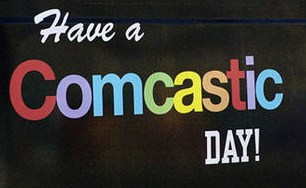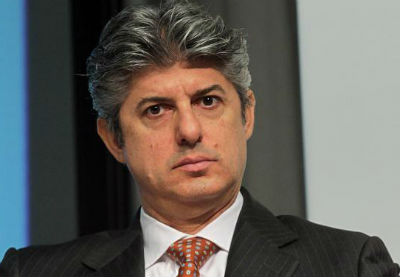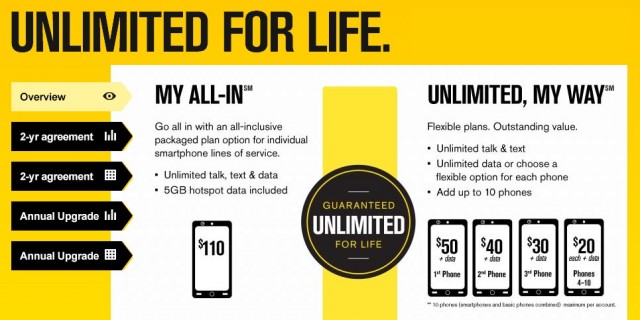 Verizon Wireless’ ongoing campaign to get rid of its grandfathered unlimited data customers continues this week with news the carrier will begin throttling speeds of off-contract customers still hanging on to their uncapped data plans starting Oct 1.
Verizon Wireless’ ongoing campaign to get rid of its grandfathered unlimited data customers continues this week with news the carrier will begin throttling speeds of off-contract customers still hanging on to their uncapped data plans starting Oct 1.
Verizon doesn’t call the enforcement of speed reductions a “throttle,” but rather “Network Optimization”:
Verizon Wireless strives to provide its customers with the best wireless experience when using our network. In 2011, Verizon Wireless launched Network Optimization, which slows the data speeds of its unlimited data subscribers with 3G devices who are in the top 5% of data users when they connect to a cell site experiencing high demand.
Effective October 1, Verizon Wireless will expand its existing Network Optimization policy to include its unlimited data subscribers using 4G LTE devices who have fulfilled their minimum contract term. Based on your plan and recent data usage, one or more lines on your account may experience a reduction in data speeds when connected to a cell site experiencing high demand. Customers on MORE Everything or other usage-based data plans are not subject to Network Optimization. For more information about our Network Optimization, please refer to www.verizonwireless.com/networkoptimization.
Verizon Wireless customers on the company’s 3G network have been subject to speed throttling for several years if Verizon deems them a “heavy user,” but the company’s 4G LTE network avoided the speed noose until now. Customers who find themselves subjected to Verizon’s speed limiter report it is a very unpleasant experience.
 “My phone has been throttled and is now essentially unusable for the very things it is marketed for,” reports one customer sentenced by Verizon’s “Network Optimization.” “I can send texts, emails, and view basic websites but any sort of streaming is now out of the question for the remainder of the billing cycle and possibly the next cycle as well.”
“My phone has been throttled and is now essentially unusable for the very things it is marketed for,” reports one customer sentenced by Verizon’s “Network Optimization.” “I can send texts, emails, and view basic websites but any sort of streaming is now out of the question for the remainder of the billing cycle and possibly the next cycle as well.”
The throttle effectively limits speeds to well under 300kbps, and in most urban areas where cell tower usage is higher, punished customers have to live with speeds of around 50kbps — the same as dial-up.
Verizon’s logic and consistency about its “Network Optimization” faced customer scrutiny as well.
“This is not about equal opportunity bandwidth, it’s about Verizon realizing they can increase their revenue stream, otherwise, wouldn’t those tiered folks be getting throttled as well if they ‘abused’ and used ‘inordinate’ amounts of data? Oh no, of course not, Verizon just bills them more. This scenario is as ridiculous as charging $20/month for text messaging, which, by the way, is also data.”
What makes you speed-throttling-worthy? According to Droid Life, which broke the story, anyone using more than 4.7GB of data per month on a busy cell tower is likely to end up on a speed diet.
Verizon claims its “Network Optimization” is designed to protect the usage experience among all of its customers, and suggests the speed reductions will only occur when a heavy user is connected to a “high demand” cell site.
“Once you leave that site and attach to a new cell site without high demand, your speeds return to normal,” claims Verizon. “Other carriers often throttle you no matter what throughout the end of a billing cycle.”
But Verizon’s gesture isn’t as generous as it first suggests.
Once a customer is suspected of being a data hog and forced to endure Verizon’s speed throttle, they can stay in Verizon’s speed prison for up to 60 days after being sentenced. The result is dramatically reduced data speeds when a customer happens to travel through a busy cell site area, regardless of whether they are using a lot of data at the time or not.
Network congestion problems may be a result of too many customers connected to a single cell site at any one time, several customers concurrently engaged in high bandwidth traffic exchanges through a cell site, or Verizon’s inadequate capacity to meet even the reasonable needs of its wireless customers.
But regardless of the cause, only one group will be punished for their usage-excess: unlimited data plan customers who are now mostly off-contract (Verizon requires most customers signing a contract renewal that includes equipment discounts to migrate off their unlimited plan, which stopped being sold to new customers in June, 2012.)
Customers can get out of speed jail permanently simply by agreeing to give up their unlimited data plan. Then they can use (and abuse) Verizon’s limited wireless bandwidth, whether it slows every other customer down or not.


 Subscribe
Subscribe
 Stop the Cap! has talked with more than a dozen customers in Comcast’s test markets about their experiences with Comcast’s “data usage policy.” Although the company claims it is seeking customer reactions, it never asks whether those customers want usage limits or not, only what kind.
Stop the Cap! has talked with more than a dozen customers in Comcast’s test markets about their experiences with Comcast’s “data usage policy.” Although the company claims it is seeking customer reactions, it never asks whether those customers want usage limits or not, only what kind. Sprint says the throttle will only be activated on “congested cell sites” and will impact WiMAX, 3G and LTE 4G networks owned by the company. Anyone who has used Sprint’s 3G network will discover most urban and suburban Sprint cell towers are frequently congested, judging by the low speeds many customers endure. Rural customers or those served on the edge of a suburban area may never find themselves throttled and Sprint promises once traffic clears, the throttle is shut off.
Sprint says the throttle will only be activated on “congested cell sites” and will impact WiMAX, 3G and LTE 4G networks owned by the company. Anyone who has used Sprint’s 3G network will discover most urban and suburban Sprint cell towers are frequently congested, judging by the low speeds many customers endure. Rural customers or those served on the edge of a suburban area may never find themselves throttled and Sprint promises once traffic clears, the throttle is shut off.

 “The first target now for a phone carrier is upgrading networks and transform it to a platform for high-value services,” Patuano said. “This is exactly what AT&T did and what we are calling for.”
“The first target now for a phone carrier is upgrading networks and transform it to a platform for high-value services,” Patuano said. “This is exactly what AT&T did and what we are calling for.” A
A  At least one Wall Street analyst agreed with Sprint.
At least one Wall Street analyst agreed with Sprint.